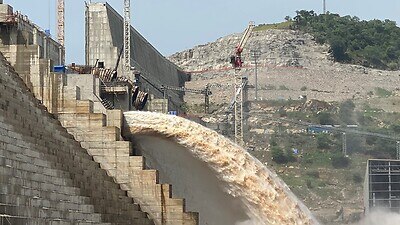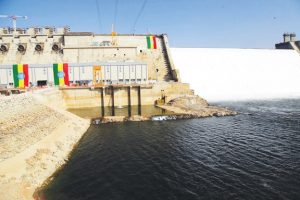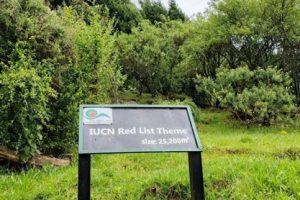
Various attempts have been made by all successive governments of Ethiopia to construct a hydroelectric power dam on the Nile River. After various challenges, the influence of foreign power, lack of finance, absence of cooperation from downstream countries, and so on, Ethiopia has launched the construction of the Grand Ethiopian Renaissance Dam (GERD) eleven years back.
GERD is mainly constructed to significantly respond to the energy demand of the nation. Access to electricity has been a major challenge for the socio-economic development of the country.
However, Africa including Ethiopia has ample hydro, solar, wind, and bioenergy resources, but access to electricity is a problem for the majority of the people in Ethiopia. Low generation capacity and efficiency, high costs, unreliable energy supplies, low access rates, and so on are major problems for the development of electric power in Africa in general, and Ethiopia in particular.
Since energy demand is the question of every country, GERD is constructed to generate clean, renewable, and affordable energy production for Ethiopia including the Horn countries which significantly solves the energy shortage of the sub-continent.
According to World Bank 2021 report, universally, people without access to electricity declined from 1.2 billion in 2010 to 759 million in 2019; nevertheless, it is still a problem in Africa. African Union 2022 report also affirms that over half a million people live without electricity links while in 2020 electrical energy was inaccessible to 581 million Africans. This shows that five out of every 10 individuals below the Sahara lived in the dark where the situation was even worse and more than 70 percent of the population lacked access to electricity in rural areas.
The World Bank report further explained that, over the past decade, the government of Ethiopia has made encouraging progress on its electrification program and expanded the grid network coverage to nearly 60 percent of towns and villages. Despite this progress, Ethiopia has the third-largest energy access deficit in Sub-Saharan Africa with more than half the population still without access to reliable electricity, especially in deep-rural areas which are dependent on biomass and kerosene.
The electricity deficit in Ethiopia continues to exacerbate the poverty situation, preventing far too many people from fulfilling their basic socio-economic needs and limiting access to opportunity. Taking these facts into consideration, the Ethiopian government, following the political reform in Ethiopia in mid-2018, shows its commitment to completing the GERD with active people participation.
Consequently, GERD, as of February 20, 2022, has begun generating 357 MW of hydroelectric power. According to GERD Management Board Chairman Abraham Belay (Ph.D.), Ethiopia’s energy demand is growing at an annual rate of 13 percent. So, the dam significantly contributes to fulfilling the growing energy demand of the country. The dam has an all-rounded impact not only on Ethiopia but also on the continent since it keeps the biodiversity of the country.
Ethiopian Prime Minister Abiy Ahmed (Ph.D.) noted “GERD benefits all African brothers and sisters. Ethiopia does not want to harm anyone. The country’s goal is to use the power for its large population that has never seen electricity and alleviate poverty.
Indeed, the beginning of constructing GERD entertains both bad and good news for Ethiopians. Despite the news, GERD has more than 11 benefits for Ethiopia: economic growth, cooperation, clean energy, mitigating climate change, unity and togetherness, the sign of independence, technology transfer, financial sources (funding), bringing back lost species, encouragement to the tourism sector and improvement in the skill of negotiation.
Hawassa University Water Supply and Environmental Engineering lecturer Mihret Dananto said that, GERD will highly stimulate the overall economy of the country by covering the power supply gap and increasing power export earnings which will eventually make Ethiopia a geopolitical power in Africa.
GERD is also an important area of cooperation in the region since power cooperation has been started between Ethiopia, Djibouti, and Sudan. According to Mihret, currently, Ethiopia utilizes less than 2,100 MW. The addition of over 6,000 MW of hydroelectric power to be obtained from GERD will therefore fulfill domestic needs and increase the country’s electric power export potential which is important for regional integration and cooperation.
The dam provides the opportunity to generate clean energy from the Nile River. Studies show that the dam will offer the country sufficient and sustainable electricity supply for at least the coming 50 to 100 years. GERD is a good example since hydroelectric power for clean, affordable, and non-polluting energy.
Yalemzewd Nigussie (2021) article entitled “GERD: A Quest for Surviving Abject Poverty” stated that, climate change has impacted all paces of life all over the world. GERD, as a renewable energy mechanism, will make Ethiopia a major contributor to global carbon mitigation efforts. Realizing GERD will also enable many (60-70 percent) Ethiopians accessible to clean energy and contribute to the reduction in carbon emissions from deforestation for firewood purposes.
Ethiopians and the Diasporas have shown their commitment to their country since the beginning of construction of the dam. GERD is a symbol of unity, and togetherness for Ethiopians where the people and Government of Ethiopia are funding the project. Office of the National Council for the Coordination of Public Participation to the Construction of GERD Director-General, Aregawi Berhe noted that, finishing the dam is a sign of achievement because it is being built by the sweat and blood of all Ethiopians at home and abroad.
Besides, GERD is a manifestation of Ethiopia’s sovereignty and independence. Morgan State University Political Science and International Relations, Professor Getachew Metaferia said building the GERD is not a matter of choice, but a developmental necessity and a way to alleviate poverty for a nation and its people. It is also a sign of independence.
The other very essential issue concerning the dam is technology transfer. The involvement of foreign companies in GERD construction is playing an imperative role in transferring skill, knowledge, and technology which would be very important to the technological transformation of the country.
Throughout the construction, Ethiopians have reaffirmed unreserved financial contribution to the completion of GERD. The public and the government have been continuing their contribution to the Dam. The dam is being funded by government bonds and private donations.
The completion of GERD enables environmental protection and forest conservation across the country by bringing lost seedlings plantation and species across the basin and the water origins of the tributaries of the Blue Nile River. Furthermore, GERD, along with environmental protection, conservation, ecological restoration, and improving the livelihood of the rural population, encourages the tourism sector.
Ethiopia has a firm commitment to solving any conflictual issues via negation. A peaceful resolution of the matter of GERD based on cooperation, and negotiations would help to reach reasonable utilization of the dam. The negation that has been held among Ethiopia, Egypt, and Sudan not only helps Ethiopia to protect its national interest but also provides negation skills for Ethiopia and the negotiators. According to Prime Minister Abiy Ahmed, Ethiopia is always open to a win-win solution about the GERD. The country wants to work cooperatively and through negotiation with the Egyptian and Sudanese brothers.
Despite various challenges, the construction of GERD, for the last 11 years, has brought 11 benefits to Ethiopia. When Ethiopians celebrate the 12th anniversary of cornerstone placing next year, we should redouble our efforts for the completion of the dam
BY EPHREM ANDARGACHEW
The Ethiopian Herald 3 April 2022





